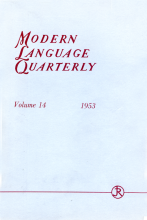Last December, when I was looking through early issues of Modern Language Quarterly, I came across an essay by Richard j. Browne and M. C. Davis, "Goethe and the Yo-Yo," Modern Language Quarterly (1953) 14 (1): 98–101. It's quite brief and delightfully informative. The word yo-yo is a deformation of the French joujou, which means a toy, and it was invented in the late 18th century and fascinated Goethe. Jane has written about will-o'-the-wisps in Goethe's imagination and has now taken up the yo-yo as well, both of them as models for Goethe's version of dialectical thinking. It's a lovely example of how literature can bring together everyday experience and conceptual abstraction to teach and to explore the resources of being human.
Here is the PDF of Goethe and the Yo-Yo: /sites/german/files/documents/newsletters/ddmlq_14_1_98.pdf
